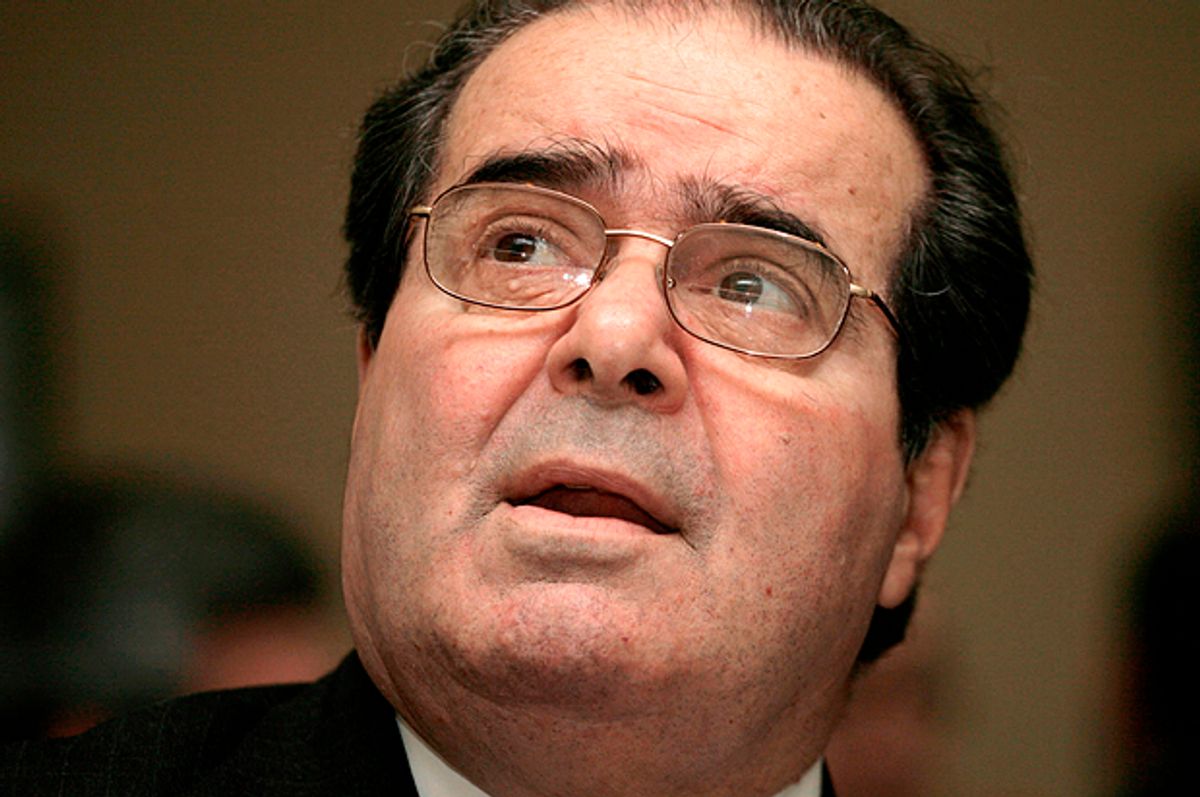President Donald Trump has tapped lawyer Eugene Scalia, the son of the late Supreme Court Justice Antonin Scalia, to be his new labor secretary.
Trump announced the news of his planned nomination Thursday evening, less than a week after Labor Secretary Alexander Acosta resigned amid renewed scrutiny over his role in arranging lenient plea agreement in 2008 for wealthy sex offender Jeffrey Epstein. The financier was indicted earlier this month on charges of sexually abusing dozens of underage girls, some as young as 14, in New York in Florida. He pleaded not guilty.
Trump had previously announced that Acosta would be succeeded in an acting capacity by his deputy, Patrick Pizzella, who many Republicans had expected to get a formal nomination.
In announcing his decision to nominate Scalia, who is currently a partner at the international law firm Gibson, Dunn & Crutcher, Trump tweeted: "Gene has led a life of great success in the legal and labor field and is highly respected not only as a lawyer, but as a lawyer with great experience working with labor and everyone else."
If confirmed, he will be returning to the department where he served from 2002 to 2003 as solicitor in President George W. Bush's administration, overseeing civil trial litigation and legal support on rulemakings and administrative law.
Bush nominated Scalia only a month after he helped overturn a broad Labor Department compliance program on workplace safety standards. Scalia argued at the time that ergonomics rules intended to prevent repetitive-motion injuries were based on "thoroughly unreliable science."
Bush used a recess appointment in January 2002 to install Scalia, who faced opposition from Democrats, labor unions and worker advocates, because of concerns that he would not be able to get the votes necessary to confirm him in the Democratic-controlled Senate.
"Scalia's record, scholarship, and testimony do not illustrate that he will be an effective advocate for America's workers. In fact, his experience and record suggest a hostility to the laws he would be sworn to uphold. To date, his positions have been in direct opposition to workers' safety, the ADA, sexual harassment claims, and other worker protections," Sen. Patty Murray, D-Wash., said in 2001, opposing Scalia's nomination. Murray is the top Democrat on the Health, Education, Labor and Pensions (HELP) Committee, which has jurisdiction over DOL nominees.
Murray has not responded to Salon's request for comment, but divisions between Republicans and Democrats about Scalia's nomination have already surfaced.
Sen. Chuck Schumer, D-N.Y., argued that by nominating Scalia, Trump was "missing an opportunity to nominate a fighter for workers, like a union member, to be America's next Labor Secretary. Instead, he has again chosen someone who has proven to put corporate interests over those of worker rights."
Meanwhile Sen. Tom Cotton, R-Ark., described Scalia as "outstanding lawyer who has vigorously defended the Constitution over a long career in government and private practice. I'm confident he'll be a champion for working Americans against red tape and burdensome regulation as Labor Secretary."
Beyond the Department of Labor, Scalia worked for the Justice Department, serving as a special assistant to Attorney General William Barr from 1992-93 during Barr's first stint as attorney general in the administration of President George H.W. Bush.
At age 22, he worked as a speechwriter for Education Secretary William Bennett in President Ronald Reagan's administration before going to University of Chicago Law School.
He has argued that his legal positions are separate from politics and that the arguments he uses are part of the "system of checks and balances" that are at the "heart of democratic self-government."
"The government has to adhere to the law and this is a country where if the government doesn't adhere to the law you can take them to court and get a remedy," Scalia told The WSJ in 2012.
But during the 2008 election cycle, Scalia joined a dozen prominent Republican lawyers to endorse Mitt Romney's presidential campaign as part of "Lawyers for Romney."
In private practice, Scalia has earned a reputation for his challenges to federal regulators on behalf of corporate clients. Scalia's law firm biography cites his "success bringing legal challenges to federal agency actions."
He represented Wal-Mart in 2006 against a law in Maryland that would have required the retail giant to spend more more money on health care for its employees.
"Its widely recognized that employers and employees need more assistance addressing problems with rising health-care costs," Scalia said at the time, arguing that "attempts to address the problem are going to require a federal response, not a patchwork of state and local mandates."
In 2012, The Wall Street Journal described him as "one of the industry's go-to guys for challenging financial regulations," while Bloomberg Businessweek published an article titled: "Suing the Government? Call Scalia!"
Scalia has also defended Boeing Co. in a challenge by the National Labor Relations Board over the aerospace company's decision to transfer work to a factory in a nonunion facility, and SeaWorld Entertainment Inc. in a case against the Occupational Safety and Health Administration following the death of a trainer by a killer whale. Supreme Court Justice Brett Kavanaugh, then a federal judge, sided with SeaWorld.
Scalia also played a key role in getting a federal judge to void the Labor Department's "fiduciary rule," a measure adopted in 2016 under President Barack Obama to curb conflicts of interests among brokers and insurance agents who service retirement accounts. Under the rule, investment advisers were required to recommend the "best" product, raising the standard for advice.
In an op-ed published in The Wall Street Journal in 2017, Scalia called the law a "regulatory Godzilla — an extraordinary example of disregard for limitations imposed by Congress and the Constitution."



Shares